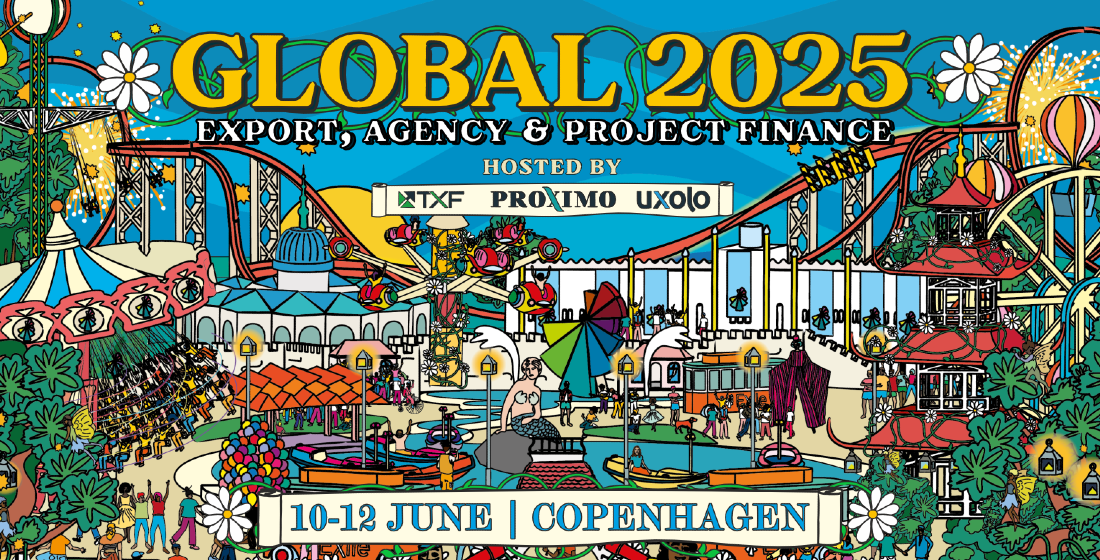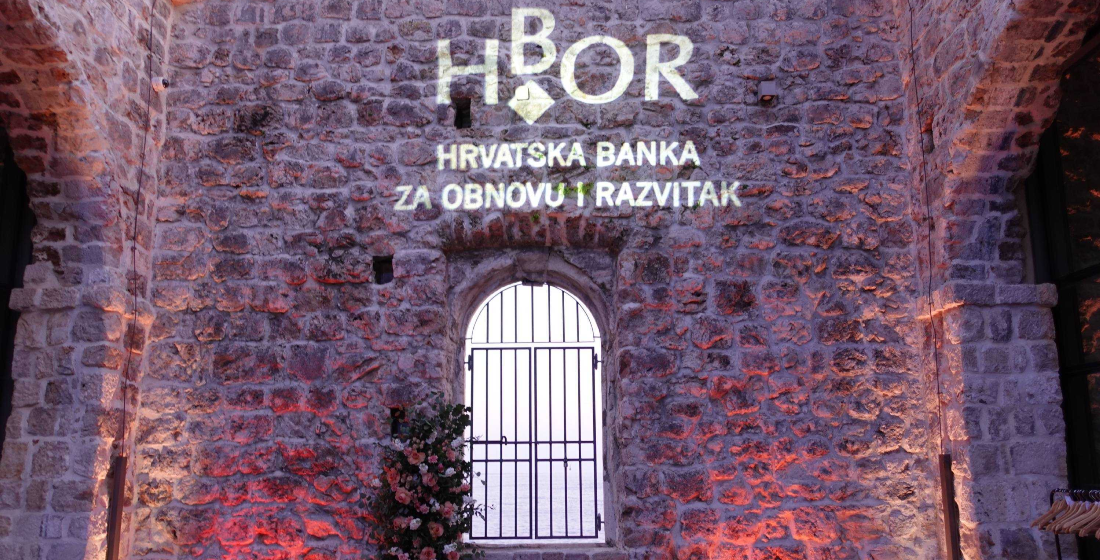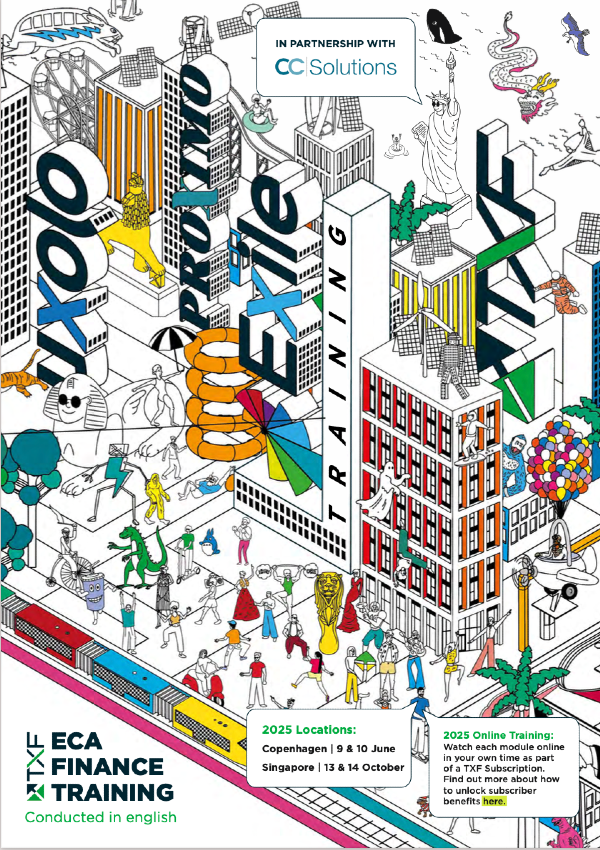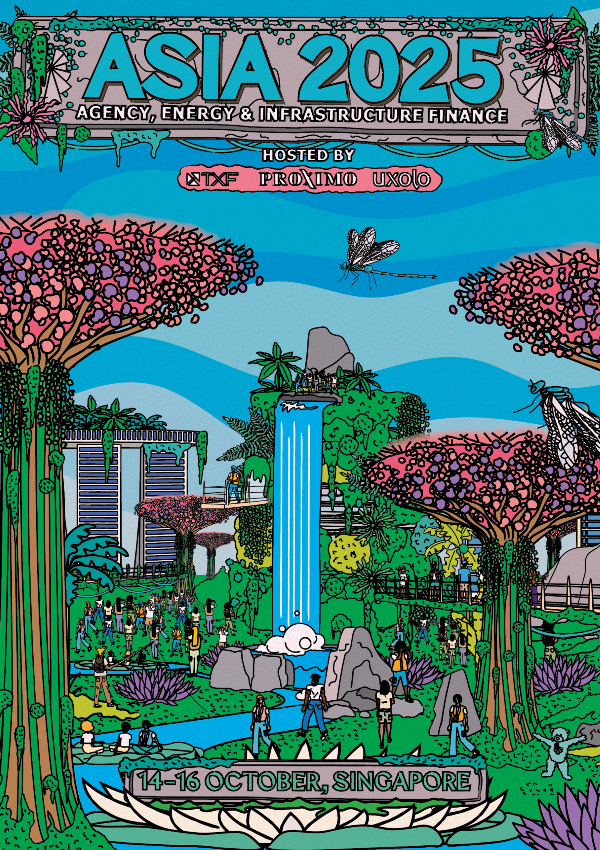It’s only export finance rock and roll 2019 (but I liked it)
TXF’s top takeaways from the biggest gathering of the export and project finance community in the world, TXF Global 2019, are here.
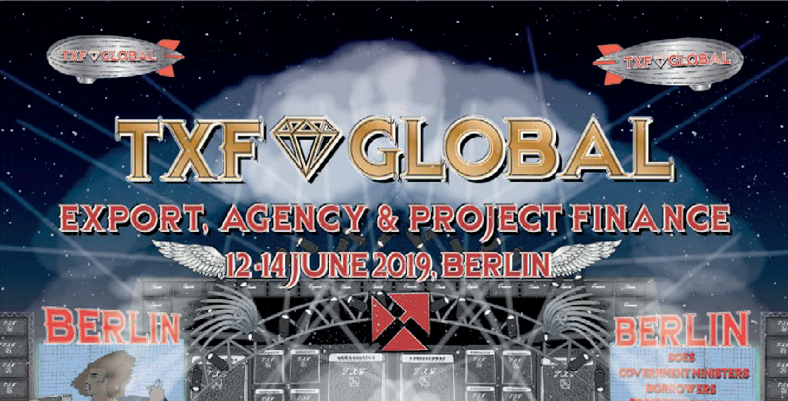
It was a rock and roll-themed extravaganza when the global export finance community gathered for TXF Global 2019: Export, Agency & Project Finance in Berlin’s Grand Hyatt hotel from 12-14 June.
As geopolitical tensions rise and protectionist tendencies grow around the world, it was clearer than ever that the role export credit agencies (ECAs) and the private insurance market play are paramount in getting export contracts and large-scale projects over the financial line, both in developed and developing markets.
From news on the modernisation of the OECD Consensus expected this November to paying ECA premiums upfront for the maturity of project loans, there was plenty to keep the market rocking into 2020.
You really got me with ECAs
Exporters have been increasingly turning to ECA support in uncertain political times and US-China trade wars. The volume was turned up to 11 last year when ECAs had a banner 2018 – albeit mainly closed in the last quarter. And with greater market uncertainty, ECA volumes look set to increase.
Can’t get no satisfaction on the OECD Consensus
Are the OECD rules fit for purpose in a trade war environment? There was agreement from the ministerial keynote to the closing panel: the OECD Consensus is behind the times, even anti-competitive, and needs to reflect current trends in trade and manufacturing. Some suggested because there is Chinese involvement, the International Working Group (IWG) could be a better mechanism to move things forward. In fact, there were even arguments for something more radical than the IWG Guidelines altogether.
Meanwhile, at the OECD annual meeting on export credits in Paris (which took place on the same week as TXF Global), members finally agreed to start the process to begin updating the Consensus. Wait until November for a timetable for next steps.
Back on the road again for US-Exim
US-Exim is back in business and with a clear message that they have support from above. However, nearly half the audience polled thought US Exim would mean increased competition going forward. But, those keen to modernise the agency and outdated rules related to content and shipping may find themselves disappointed. Securing a long-term full reauthorisation later this year is the key focus and needs to be voted on by Congress and the Senate. In the meantime, US-Exim has a board to vote on large-scale new transactions and policy items, but there is much work to be done to re-iginite its stagnant $40 billion transaction pipeline backlog.
It's so funny, how we don’t talk anymore
There is a split on how different banks see export finance. Over 200 banks provide liquidity into ECA assets but many voiced concerns on price compression. Will they think about how they price going forward? Some banks like the market penetration that their key customer base ECAs give, others are struggling to justify big teams delivering long-dated, illiquid assets against an unconducive regulatory environment.
With inverted yield curves, and concern that ECA-backed loans are mispriced, can banks continue without greater creativity in terms of how fees are earned and banks are rewarded?
Conversely, ECA-backed tranches were trimmed on large-scale multisourced financings, as once ECA premiums were added, coupled with borrowers having to pay premiums upfront for the maturity of the loan, uncovered commercial debt portions proved cheaper in 2018, especially in the Middle East (Bapco and Duqm).
Smells like teen spirit? Competition and innovation among ECAs
From a slow start, ECAs want to be faster, more responsive and are investing in digitising their processes and customer interaction. They are also looking for ways to get closer to the customer at both ends of the equation, with shopping lines for key borrowers, and overseas business development teams in core markets.
Concentration risk still exists and the trend for big projects for well-known exporters and borrowers is expected to stay. But such a refreshing approach from ECAs is bound to make the product more relevant to a wider pool over the long run. Risks remain that greater competition among ECAs means a ‘race to the bottom’? Or is it purely a reflection of ECAs wanting to be able to provide the best terms and conditions?
Gimme shelter with private insurance?
Private insurance has ballooned to a $3.2 billion market capacity with over 60 providers, and a book that now represents 20% of all Berne Union volume. But misunderstandings still abound – about what the role of brokers is, when to approach the market, what future regulation will hold, and whether it pays out. Education of bankers, credit committees, regulators and exporters has to continue.
Stairway to heaven through SDGs
Seventeen percent of current export finance transactions globally would qualify for having a positive green or social impact under green bond principles’ methodology. That’s according to TXF analysis undertaken with Acre Capital. Could do better? Probably. Denmark’s EKF leads the ECA pack on sustainability in terms of volume, with European renewables the biggest beneficiary. But both ECAs and banks need to do more to align their SDG goals. Likewise, there is still a significant cost stapled to carrying out environmental and social impact assessments, which deters many borrowers and exporters from taking the SDG route.
Rockin’ in the free world or another brick in the wall for the future?
Without additional incentives – relaxing ECA premiums and/or incentivising individuals within organisations – the challenge remains to identify enough bankable assets to see meaningful increase in the number of deals with a positive impact. There is a wall of liquidity waiting, and a huge opportunity, but the deal pipeline must be widened, especially for smaller transactions, and the process simplified for SMEs. The whole export finance sector knows it needs to wake up and embrace new borrowers, sponsors and markets and help create bankable deals. Rock on 2020!
Now time to get up to speed on the markets.
Here's our exclusive TXF Essentials subscriber content
Shop Talk: Moving compliance in trade forward with NextGen
Valeria Sica, global head of trade services for Citi’s Treasury and Trade Solutions talks to TXF about how the bank is using Artificial Intelligence (AI) to digitise compliance processes in its recently announced NextGen Project in collaboration with EY and SAS.
European solar: Panel beaters
European solar is predicted to balloon again in the next two years. But with the move to merchant, a relatively seminal corporate PPA market, development of solar-plus-storage and some very different benefits in different country jurisdictions, there is still very little that is vanilla about financing the sector.
Identity crisis (and the SWIFT way out?)
Just who are you? TXF contemplates trust in trade and the bumblebee in KYC. Some commercial KYC solutions are struggling, but SWIFT is coming into the game for corporate KYC alongside its bank registry. If banks and corporates are going to trust SWIFT for the KYC Registry, why would they need to embrace other technologies such as blockchain for trade?
Plus, to top things off..
the news you thought you had but didn't.
Oman closes UKEF-backed facility for three hospitals
Oman’s Ministry of Finance reached full financial close on a $873.8 million UKEF-backed facility last week to finance the construction of three hospitals in the sultanate. The deal signed on 15 February 2019.
Nam Dinh 1 nears financial close on Sinosure-covered loan
Sponsors of the $2.2 billion 1.2GW Nam Dinh 1 coal-fired power plant in Vietnam – Acwa Power and Taekwang Power – are expected to reach financial close next month on a $1.9 billion Sinosure-backed facility to fund the scheme.
DCT Gdansk debt reaches close
PSA International, the Polish Development Fund (PFR) and IFM Global Infrastructure Fund (GIF) – via borrowing vehicle Holbrook – reached financial close on 31 May on the brownfield debt financing linked to their recent acquisition of Polish container terminal operator DCT Gdansk.
Duqm vehicle eyes $10bn petchem project financing
Duqm Refinery and Petrochemical Industries Company (DRPIC), a state-owned joint venture between Oman Oil Company and Kuwait Petroleum International, is expected to launch the financing at the end of 2019 for a $10 billion petrochemical project in Oman.
Milan Metro Line 5 debt repriced
The Metro 5 consortium – comprising FS Italiane, Astaldi, Ansaldo STS, Azienda Trasporti Milanesi, Alstom and Hitachi Rail Italy – has negotiated a margin cut on the combined bank and project bond debt it raised in 2015 for the Milan Metro Line 5 project.
Grasshopper Solar closes $185m acquisition financing
Canada-based Grasshopper Solar has closed on $185 million of five-year senior debt from sole lender Deutsche Bank to finance the acquisition of a portfolio of solar projects in Japan.
ENGIE-led team to sign Senegalese solar projects next week
ENGIE, Meridiam and Senegalese sovereign fund FONSIS are set to sign a DFI-backed financing next week for the 30MW Toube and 30MW Kahone solar plants in Senegal. Financial close is expected next month.
RFP responses in for Formosa 2
Sponsors of the 386MW Formosa 2 offshore wind farm in Taiwan – Macquarie Capital (75%) and Swancor (25%) – received RFP responses from commercial banks this week.
Allego closes hybrid debt for EV charging expansion
Meridiam has raised a €150 million ($168 million) hybrid project/corporate financing to fund expansion of its Netherlands-based electric vehicle (EV) charging infrastructure business Allego – the first EV financing of scale in Europe and the strongest signal yet that the sector is close to transitioning from equity and venture capital financing to mainstream project debt.
Turkmenistan out to banks for DFI/ECA-backed man-made lake
Turkmenistan’s Ministry of Finance (MoF) is sounding out commercial banks to finance the construction of the second phase of the Altyn Asyr lake, a man-made lake in the middle of the Karakum desert.
2.5GW Gulf PD project out to banks
Independent Power Development (IPD) – a joint venture between Gulf Energy Development (GED) and Mitsui – is said to be testing bank appetite for around $1 billion of project debt for its 2.5GW Gulf PD gas-fired power project in Pluak Daeng district, Rayong, Thailand.
TAG closes acquisition financing
On 13 June 2019 French company Engie (58.5%) and Canadian fund Caisse de Depot et Placement du Quebec (31.5%) paid around R31.5 billion ($8.6 billion) for the acquisition of a 90% stake in Petrobras' pipeline asset Transportadora Associada de Gas (TAG), with Petrobras retaining a 10% stake in the scheme.


